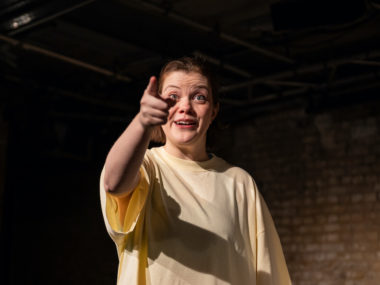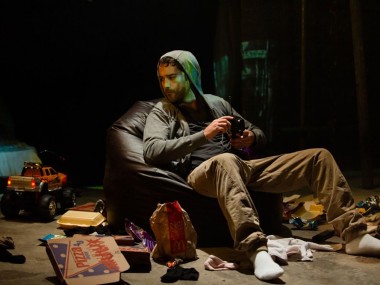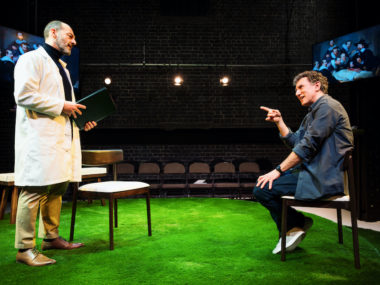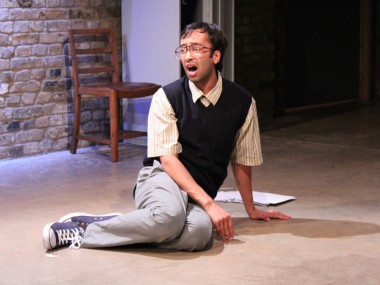Crocodile Fever, Arcola Theatre
Thursday 23rd October 2025

Weird scenes inside the farmhouse; weird scenes in Northern Ireland; weird scenes of the 1980s. Meghan Tyler’s Crocodile Fever at the Arcola Theatre is a breath-takingly eccentric and wonderfully exaggerated piece of energetic new writing. It sings. It scorches. It burns. First staged at Edinburgh’s Traverse Theatre and the Lyric in Belfast in 2019, this irrepressibly fizzing piece now has its London premiere in a brand-new production starring the playwright in one of the leading roles. Directed by the Arcola’s artistic director Mehmet Ergen, this Stewart Parker Trust Award-winning dark comedy takes two Northern Irish sisters not so much on a journey, as on a furiously punky helter-skelter.
It’s 1989, and — after 11 years of separation — the unchained and energetic Fianna Devlin (Tyler) crashes into the life of her secluded and pious sister Alannah (Rachael Rooney) by literally smashing through her window. She is a member of IRA and has served time in prison after the death of the siblings’ mother in a fire. Her persona has been galvanized by her politics: she’s a real live wire. Meanwhile, Alannah has stayed at home and looked after their Da (father), who is now disabled and bed-bound. Her reaction to her role as carer is extremely neurotic: she cleans compulsively, puts cleaning liquid into separate bottles, and puts any rubbish straight outside. She also has a stash of emergency crisps.
These contrasts between the two siblings are vividly imagined: while the older Alannah cleans the hob with a toothbrush, Fianna comes equipped with a knife and a gun. But while the former at first resents the arrival of the latter, the gradual consumption of gin and whisky slowly leads to a thaw, as both begin to understand the role of their father in their oppression. In a play that’s rich in symbolism, in fact a feast of symbology, Da represents the patriarchy and his daughters the raging furies of retribution. They are sisters, but can they create a sisterhood? A story that starts with normal family bickering grows and grows and yes, grows some more into a tempest of violence and savagery.
One of the ways in which the women bond is through music. An early highpoint is their discussion of Toto’s 1982 song “Africa”, whose lyrics about “I bless the rains down in Africa” has been misheard by Alannah as “rains down on apricots”. There’s a lot of fun to be had with this mondegreen, and with her specially weird interpretation of the song, whose other lyrics, such as “The wild dogs cry out in the night/ As they grow restless, longing for some solitary company” seem very apt for this tale. As they play other 1980s pop songs, and some older Tony Bennett numbers, they also explore the legends of the Asmat Tribe of New Guinea, whose history of headhunting, cannibalism, ancestral rituals and recent conversions to Catholicism fit very snugly into the context of The Troubles and give the audience a good steer as to how things will develop. Likewise, the appearance of a chainsaw, as well as Fianna’s pistol, is a strong indicator of the way things are going.
Tyler writes with a smouldering anger which is punctuated by imaginative sparkles that remind me of the best of Philip Ridley’s work — his excellent Poltergeist monologue was staged last month at this venue — and by a raging embrace of pop culture. At one point the sisters discuss the classic horror film Carrie, with its blood-drenched symbolism recreated here as a passionate howl against patriarchal attitudes. Other symbols include some spirited crisp-packet crushing, old Da’s evil-smelling pipe and a crocodile climax that must be, by a long way, the weirdest thing at the moment on the London stage. This feverish drama feels like a magic blend of Martin McDonagh’s The Lieutenant of Inishmore and Alistair McDowall’s Pomona — yes, it’s that good.
There’s further symbolism to be squeezed out of the idea that family relationships are a form of cannibalism, in which members feed off each other, while the idea of blood sacrifice, and the image of the blood of Christ, play to the Catholic background of the story. At the same time, the Good Book (Bible) is revealed to be full of bad ideas, which are as weird as any you can think of, and burning fire once again is the ultimate cleansing agent. Under an altar that celebrates their dead mother, like a shrine to the Blessed Virgin Mary, the women’s revenge against misogyny is terrifically over-the-top, but expresses Tyler’s rage perfectly and with enormous theatrical vigour. It’s gory alright, but also bleakly funny.
Ergen’s production, on Merve Yörük’s rather untidy kitchen set, boasts a couple of super performances from Tyler — the sister as avenging angel, but also as an inspiration to revolt — and Rooney, who is brilliantly robotic and repressed at first, and then develops before our eyes into a banshee ready to haunt the family to the end. Both interact convincingly while Stephen Kennedy’s Da presides at the end like a figure from an ancient Greek tragedy, a monstrous individual who uses his charm as manipulation to avoid the consequences of toxic masculinity. Crocodile Fever is a contemporary piece of Grand Guignol, which mixes domestic with terroristic violence — it’s pretty weird and wild and warped, but it also gleams marvellously in the darkness.
This review first appeared on The Theatre Times




